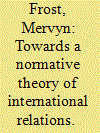| Srl | Item |
| 1 |
ID:
085282


|
|
|
| 2 |
ID:
113737


|
|
|
|
|
| Publication |
2012.
|
| Summary/Abstract |
There is an ethical imperative to analyze the ethical issues built into every aspect of the discipline of IR. Also, the "Ethics of IR"? is not a sub-discipline of IR, but is core to the whole discipline.
|
|
|
|
|
|
|
|
|
|
|
|
|
|
|
|
| 3 |
ID:
030586


|
|
|
|
|
| Publication |
Cambridge, Cambridge University Press, 1986.
|
| Description |
x, 241p.
|
| Standard Number |
0521305128
|
|
|
|
|
|
|
|
|
|
|
|
Copies: C:1/I:0,R:0,Q:0
Circulation
| Accession# | Call# | Current Location | Status | Policy | Location |
| 028010 | 327.101/FRO 028010 | Main | On Shelf | General | |
|
|
|
|
| 4 |
ID:
144060


|
|
|
|
|
| Summary/Abstract |
Scholars from the recent ‘practice turn’ in International Relations have urged us to rethink the international realm in terms of practices. The principal exponents of the turn, Emanuel Adler and Vincent Pouliot, have refurbished Pierre Bourdieu’s theory of practice to produce their own account of international practices. In a review of the practice turn, Chris Brown has argued that Bourdieu’s notion of practice shares basic affinities with Aristotle’s concept of praxis. While practice turn scholars may not adhere to a rigid canon of thought, they seem to share an Aristotelian conception of praxis. This reading of the turn to practice, though plausible, captures one part of the story. The central thesis of the present article is that instead of one there are two, distinctive conceptions of practice – Aristotelian and Wittgensteinian – and therefore two distinctive ways in which the character of international practices might be understood. More concretely, the aim is to show that the conception of international practices, rooted in Wittgenstein’s view of practices as language-games, can be particularly illuminating to all those who seek to understand international relations.
|
|
|
|
|
|
|
|
|
|
|
|
|
|
|
|